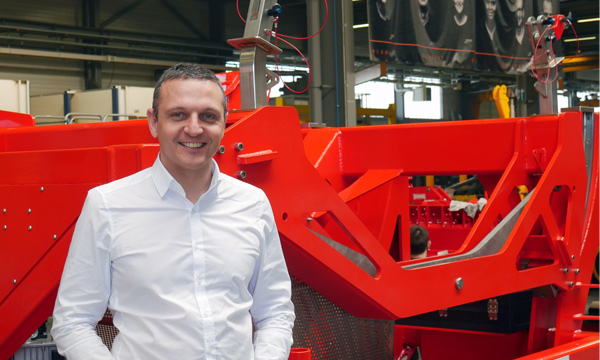New challenges for Dedienne Aerospace |
| Romain Guillot in Dubai |
|
|
02 MAR 2017 | 1376 words
|
 |
© Dedienne Aerospace |
|
|
|
The MRO Middle East trade show held in Dubai (United Arab Emirates) in early February was the perfect occasion to meet the CEO of Dedienne Aerospace. Today, this French company is one of the world's leading manufacturers of equipment for the maintenance of commercial aircraft and their engines, a further testament to this being the recent exclusive licence awarded by UTAS, which covers the nacelles of the A320neo PW1100G engine. Here Cédric Barbe reveals to us the rich history of Dedienne Aerospace, along with the perspectives and new challenges related to its worldwide success.
The company was founded by Roland Dedienne, originally from the East of France and lathe operator for Hispano-Suiza in Clamart, near Paris, during the 1940s. At that time, there was a thriving textile industry in Clamart and Roland Dedienne started to build parts to repair the weaving machines, using the means available on his employer's premises. Demand was such that it wasn't long before he set up his own company in 1947, initially a simple workshop with a few colleagues. In 1973, Jean-Claude Volot, president and owner of Dedienne Aerospace, joined his great uncle. Roland Dedienne didn't have any children and Jean-Claude Volot, a graduate of the National School of Engineers in Metz, was in fact an engineer capable of taking over the company, explains Cédric Barbe. "Jean-Claude Volot helped the company develop in three main areas: plastics manufacturing, with Dedienne Multiplasturgy, which has a very strong presence today in the regions of the west of France; Dedienne Santé in Mauguio, which is one of the current leaders for prosthetic limbs; and us, at Aerospace."
The companies dedicated to plastics manufacturing and health were sold to their respective executives and Jean-Claude Volot decided to focus on the aeronautical maintenance sector, with a strong desire to achieve a worldwide presence. So, starting in 2001, Dedienne Aerospace took an initial step in Florida by founding Dedienne Miami, a first among aeronautical tool-makers. "From Toulouse, we also took a second giant leap by setting up in Albi as well," Cédric Barbe reminisces jokingly. Dedienne had in fact just bought out one of his competitors, Payan Aéro, in 2000 which then enabled him to offer airline companies a more exhaustive range of products for their maintenance hangars. "It was then necessary to structure the group, the companies bought and those stemming from international development" he explains, comparing the company to a rugby team. "In a team, even if some members are champions, everyone needs to pull together. It's taken some time, four or five years, to be able to properly set up the range, revise the products, redesign the Payan products that were outdated and make them competitive."
Close proximity with customers
Not long after, in 2008, Dedienne launched into setting up a branch in China, in Zhuhai. "After that we started to attract more customers in the Middle East, such as Emirates, Saudi Arabia, GAMCO, then ADAT, and it seemed obvious to us that, for the big carriers, the place to be was obviously Dubai." So, Dedienne Aerospace set up in the free zone of Dubai International Airport in 2013, then in Singapore so as to be closer to its customers on site of course, but also to those in Indonesia and Malaysia. "More recently, we've also set up in Hong Kong in order to start doing business more easily with Taiwan, for example, and Macau too, although it is so close to Zhuhai", continues the CEO of Dedienne Aerospace.
He also clarifies that, after Dubai, Dedienne Aerospace has spread throughout the Middle East, including Turkey and Africa, placing a high priority on its customer services. "Our customers have workshops full of tools, some need upgrading, and others need to be tested or repaired," explains Cédric Barbe, who also tells us about the existence of an on-site design office. "Each airline company has its own specific hangar, and ways of working. That's why we quickly set up a design office here in Dubai, to customise the tools and adapt them to the needs of local customers." So, with the customer service and design office, Dedienne's establishment in Dubai has a greater understanding of the practical needs of the area, and is able to send some information back to the research unit in Toulouse, design the tools and then use the group supply chain to supply the different customers in the region.
"We seek proximity to our customers. Dedienne's proximity to numerous airlines has also contributed to the fact that OEMs soon turned to us to entrust us with their licences" remarks the CEO of Dedienne Aerospace. He also announces that improvement of the supply chain is Dedienne Aerospace's key endeavour nowadays. "We've seen significant developments in recent years and are putting a lot of effort into structuring our worldwide supply chain, reinforcing it and making it more industrial, but also making it more flexible at the same time."
The problem with new programmes and ramp-ups
Of course, Dedienne Aerospace now has to respond to two important challenges that have appeared in recent years with the problem of increased production rates combined with the arrival of new programmes on the market. "We have already seen a very strong ramp-up since 2015 to equip the workshops at Snecma (Safran Aircraft Engines) and GE. This hasn't been easy, as CFM International decided to impose quality standards on the tools that had never been implemented, or envisaged previously, with conformity rates of over 99.8%." Another trend is that, with the arrival of new programmes, all the OEMs now pay more attention to the services, and the tools are obviously a part of this. They all require a very high quality range of tools, with more and more complex products, and of increasingly greater dimensions. "15 years ago, a GE90 was considered to be very big, or even a monster, and a GP7200 was even more incredible. Now, when we look at a Trent XWB, we say to ourselves that we've gone up yet another level," the CEO of Dedienne Aerospace summarises.
Furthermore, he reveals that Dedienne has chosen to supply transport solutions for General Electric's GE9X, the engine of the future generation of 777s, thanks to its installations in Miami, which has expanded strongly since 2015. "We are proud to finally be considered as Americans, recognised for our important on-site design office, and we have been entrusted with the cocoons that are to transport the GE9X. That's quite an acknowledgement," he announces with a big smile. He also explains to us that this victory is partially down to Rolls Royce, who developed all of the Trent XWB transport solutions together with another European company. This solution proved to be really high-tech but they weren't entirely happy with it. "So they asked us to design a customer-focused product. Then we went from an 11-tonne solution to only 6 tonnes with the same results. Moreover, we progressed from installing an engine in 4 hours to just 45 minutes with our solution. The operators were quickly satisfied," he remembers.
He also highlights that the market is undergoing structuring, becoming more rigorous and focusing more on quality. Customers are also increasingly looking for more flexible solutions. "Flexibility is an extremely important point. To give an example, it is becoming less common to sell tripod jacks for just one programme. This led us to design A320/737 or A350/787 tripod jacks." Airline companies want more materials to carry out more operations, but they also want more flexibility. Using this logic, Dedienne Aerospace is developing engine stands that are also compatible with CFM56-3 and -7B, as well as V2500/CFM56 stands.
Greater flexibility and structuring of the supply chain to cover customer demands whilst remaining more open to new development opportunities, is a summary of the balancing act that Dedienne Aerospace faces today. But, according to Cédric Barbe, "at Dedienne we have a great opportunity, our teams are very solid and in just a few years, regardless of the cultural diversity in different countries, we have truly succeeded in creating a Dedienne Aerospace culture. This allows us to move faster and understand each other better, everyone being driven by the same ambition and a common goal."
|
|
 |
Romain Guillot
Chief editor
Cofounder of Journal de l'Aviation and Alertavia
|
|
| |
They made this section possible |
|
|
|
|
|
|
|
|
|
|
|
|
|
|
|
|
Top stories |
|
|
|
|
|
Top stories
|